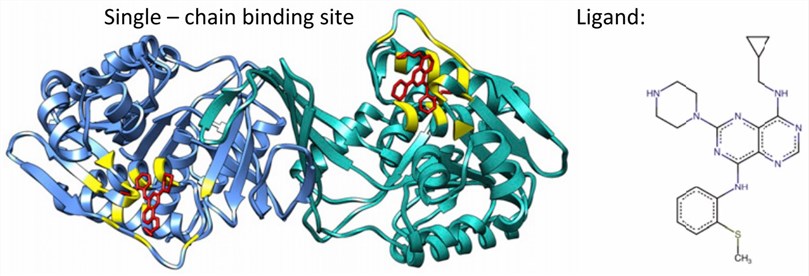What is KHK Protein
What is KHK Protein?
Ketohexokinase (KHK), a catalytic powerhouse encoded by the KHK gene on chromosome 2, exists in two isoforms—KHK-A and KHK-C. These isoforms navigate the intricate landscape of cellular metabolism, particularly in the metabolism of fructose. The primary function of KHK lies in the phosphorylation of fructose, a pivotal step in nutrient utilization and energy production within cells.

Figure 1. Human ketohexokinase complexed with pyrimidopyrimidine. (Abrusán G., et al. 2018)
The Function of KHK Protein
At its core, KHK serves as a linchpin in carbohydrate metabolism. It plays a crucial role in converting fructose to fructose-1-phosphate, a process integral to glycolysis and gluconeogenesis. The orchestrated modulation of these pathways emphasizes KHK's role in maintaining glucose homeostasis—a cornerstone of metabolic equilibrium.
Furthermore, KHK extends its influence to AMP-activated protein kinase (AMPK), a master regulator of cellular energy balance. KHK's interaction with AMPK underscores its involvement in cellular adaptation to energy stress, showcasing its impact beyond traditional carbohydrate metabolism.
Additionally, KHK wields influence over the hexosamine biosynthetic pathway (HBP). The interplay between KHK and HBP reveals a multifaceted role, linking glucose metabolism to protein modification through O-linked β-N-acetylglucosamine (O-GlcNAc). This intricate connection expands the horizon of KHK's cellular impact.
KHK-Related Diseases
As with many proteins, dysregulation or mutations in the KHK gene can lead to various diseases. One notable condition associated with KHK dysfunction is hereditary fructose intolerance (HFI). HFI is a rare genetic disorder characterized by the body's inability to break down fructose, leading to severe metabolic disturbances and potentially life-threatening complications.
Patients with HFI lack functional KHK, which impairs the conversion of fructose to fructose-1-phosphate. Consequently, accumulated fructose-1-phosphate can cause hepatocellular damage and lead to symptoms such as hypoglycemia, vomiting, and failure to thrive, particularly in infants upon the introduction of fructose-containing foods.
Understanding the molecular basis of HFI sheds light on the critical role KHK plays in maintaining metabolic equilibrium and avoiding the detrimental consequences of fructose accumulation.
KHK Related Signaling Pathways
The KHK protein's influence extends to the AMPK pathway, a critical regulator of cellular energy. Activation of AMPK by KHK prompts cellular adaptations to energy stress, balancing catabolic and anabolic processes. This interconnectedness of cellular functions highlights KHK as a key player in maintaining energy homeostasis.
The KHK protein also weaves into the hexosamine biosynthetic pathway (HBP), revealing its impact on protein modification. This intricate signaling pathway amplifies the scope of KHK's function beyond conventional carbohydrate metabolism, opening avenues for research into its diverse roles in cellular processes.
Applications of KHK in Biomedical Research
The profound understanding of KHK function has propelled its applications in the biomedical landscape.
- Targeted Therapies for Hereditary Fructose Intolerance (HFI)
Unraveling the intricacies of KHK dysfunction in HFI has paved the way for targeted therapies. Enzyme replacement, gene therapies, and small molecule inhibitors are under exploration, aiming to restore KHK activity and mitigate the consequences of fructose intolerance.
- Metabolic Syndrome and Diabetes Research
KHK's centrality in glucose metabolism positions it as a focal point in metabolic syndrome and diabetes research. Insights into its influence on glycolysis and gluconeogenesis open avenues for novel therapeutic strategies to address these prevalent metabolic disorders.
- Cancer Metabolism
The convergence of KHK with cellular energy pathways sparks interest in cancer research. Tumor cells often exhibit altered metabolism, and targeting KHK may offer novel strategies to disrupt cancer cell metabolism, presenting potential avenues for cancer therapy.
- Drug Development for Metabolic Disorders
Pharmaceuticals targeting KHK activity are under scrutiny for their potential to modulate metabolic pathways. These drugs hold promise in fine-tuning carbohydrate metabolism, providing innovative approaches to managing conditions associated with metabolic dysfunction.
The ongoing exploration of KHK opens new frontiers in molecular biology, promising transformative insights and therapeutic breakthroughs in the evolving landscape of biomedicine.
Recommended Products for KHK Protein
| Cat.# | Species | Product name | Source (Host) | Tag |
|---|---|---|---|---|
| KHK-450H | Human | Active Recombinant Human KHK, His-tagged | E.coli | His |
| KHK-151H | Human | Recombinant Human KHK protein, T7-tagged | E.coli | T7 |
| KHK-905H | Human | Recombinant Human Ketohexokinase (fructokinase) | Human | N/A |
| KHK-492H | Human | Recombinant Human KHK, MYC/DDK-tagged | HEK293 | Myc/DDK |
| KHK-3134H | Human | Recombinant Human KHK protein, GST-tagged | E.coli | GST |
| KHK-3586HFL | Human | Recombinant Full Length Human KHK, Flag-tagged | Mamanlian cells | Flag |
| KHK-2378H | Human | Recombinant Human KHK Protein (Met1-Val298), C-His tagged | Mammalian cells | C-His |
| KHK-8613M | Mouse | Recombinant Mouse KHK Protein | Mammalian Cell | His |
| Khk-1263M | Mouse | Recombinant Mouse Khk Protein, MYC/DDK-tagged | HEK293T | MYC/DDK |
| KHK-3246R | Rat | Recombinant Rat KHK Protein | Mammalian Cell | His |
Reference
- Abrusán, G., Marsh, J.A. Ligand Binding Site Structure Influences the Evolution of Protein Complex Function and Topology. Cell Rep. 2018, 22(12): 3265-3276.

